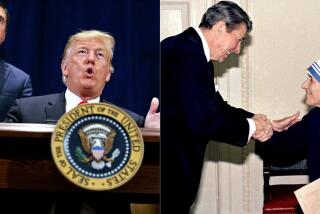COMMENTARY : GOP Torch Passes to an Old Generation : Gingrich dreamed up the revolution and then fell victim to it--and his own hubris.
- Share via
Can the Revolution survive without Newt Gingrich? That’s the question Republicans are asking this week, just a year after he was anointed Speaker of the House by his GOP colleagues. The emerging consensus is bittersweet: While the Republican thunder would never have rolled without Gingrich, it will rock on whether or not he’s at the helm.
On Nov. 27, Gingrich’s eclipse became inevitable when he bowed to reality and took himself out of the presidential race, guaranteeing that someone else would emerge in 1996 as the party’s chief message-carrier. By the end of that same week, the Washington Times, the conservative-leaning newspaper that has faithfully chronicled every moment of the Newtonian revolution, reported that Gingrich was stepping back from the limelight. He admitted to his Congressional colleagues that he thrown too many verbal “interceptions,” and so he would “sit on the bench for awhile.” The front-page picture was worth a thousand words: Gingrich obscured, standing behind Bob Dole.
It’s not quite true that “the media” are out to get Gingrich, but it certainly is true that some in the media--and many in the new cyber-media--have scored direct hits of late. Beyond ideology, there’s human nature. Gingrich has a habit of referring to reporters as “sick” and “despicable.” Such bashing breeds backlash. Still, many Washington journalists respect, even admire, Gingrich as a rare intellect willing to ask needed questions and suggest intriguing answers. Yet nationwide, Gingrich has engendered a degree of hostility not seen since the days of Richard Nixon. The difference is that today, the masses have access to communications tools that only a few futurists--including a young professor named Gingrich--dreamed of a quarter-century ago. The high-tech counter-culture has created an electronic cottage industry of on-line publications for anti-Gingrich cyberians to browse and download. NewtWatch, for example, offers a mother lode of virtualized info-nuggets: everything from Gingrich speeches and statements to campaign contributions (broken down by Zip Code), to an abstract of Gingrich’s Ph.D. dissertation to a compendium of Newt-mocking “Top 10” lists from David Letterman.
To be sure, Gingrich handed the sword to his enemies with his reckless rhetoric. Gingrich’s talky lack of discipline summons up comparisons to his fellow chubby mother-oriented Baby Boomer, Bill Clinton. Yet back in 1991, William Strauss and Neil Howe, in their pop-history classic “Generations,” plucked Gingrich out of relative obscurity and pronounced him to be an archetype of the Boom Generation. The authors noted that those born between 1943 and 1960 were better educated and more indulged than any generation before and yet this Dr. Spock upbringing gave them an almost Oedipal desire to overturn the world they inherited: “Unlike their G.I. fathers, who excelled at overcoming crisis, Boomers are attracted to the possibility of fomenting crisis.”
Indeed, the current struggle in Washington is more a repudiation of government-as-usual than it is an affirmation of what a better future would look like. And one byproduct of the latest revelations about Gingrich’s political committee, GOPAC, is proof that the Georgian was actively plotting the overthrow of the liberal establishment for many years prior to 1994. Gingrich had staged a proto-Contract with America on the steps of the Capitol in the fall of 1980; his proposal for a more ambitious event with George Bush was rejected in 1992. But as with any tragic story, the protagonist’s strength is also his weakness; Gingrich’s sense of history led him to visionary proposals, but the accompanying ego led him to document--even tape-record--seamy activities.
And so the torch seems likely to pass to an old generation. Dole’s response to Gingrich’s troubles has been mature and gracious; he referred to the Speaker on “Face the Nation” last Sunday as “the fire that started the revolution.” Dole’s generation was touched with its own kind of fire, which everyone assumed had flickered out over the intervening decades, although one wounded veteran from Kansas seems not to have been paying attention. Bosnia builds Dole’s stature, even as it shrinks Boomers’, particularly those such as Gingrich and Clinton who never answered the call to military service.
Gingrich’s ideological incandescence may flame him out. But since the domestic status quo is the real crisis confronting America, Gingrich’s vision will be a beacon. A firebrand should be pleased with that knowledge, even if the blaze burns so hot that he himself is consumed.
More to Read
Get the L.A. Times Politics newsletter
Deeply reported insights into legislation, politics and policy from Sacramento, Washington and beyond. In your inbox twice per week.
You may occasionally receive promotional content from the Los Angeles Times.










